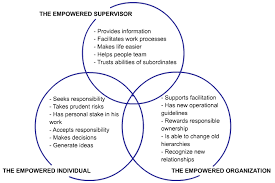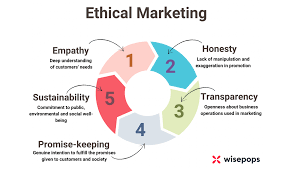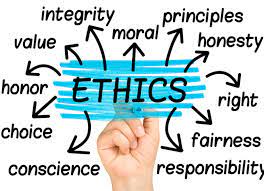Title: Embracing Ethical Marketing Practices: Building Trust and Creating a Positive Impact
Introduction:
In today’s fast-paced and hyper-connected world, consumers are becoming increasingly conscious of the impact their choices have on society and the environment. As a result, businesses are recognizing the importance of adopting ethical marketing practices to build trust, foster long-term relationships with customers, and make a positive impact on the world. In this article, we will explore the significance of ethical marketing practices and how they can benefit both businesses and consumers.
Transparency and Authenticity:
Ethical marketing begins with transparency. Businesses that openly share information about their products, processes, and values create an atmosphere of trust with their customers. By providing accurate and honest information, companies can build credibility and establish long-lasting relationships based on mutual respect.
Authenticity is another key element of ethical marketing. Consumers appreciate brands that genuinely care about their well-being rather than simply chasing profits. Demonstrating authenticity through sincere communication helps businesses connect with their audience on a deeper level.
Social Responsibility:
Ethical marketing practices involve taking responsibility for the social and environmental impacts of business operations. Companies that prioritize sustainability, fair trade, diversity, and inclusivity in their supply chains demonstrate a commitment to making a positive difference.
By promoting responsible production methods, supporting local communities, or donating a portion of profits to charitable causes, businesses can align themselves with consumer values while contributing to social progress.
Avoiding Manipulative Tactics:
Unethical marketing often relies on manipulative tactics to persuade consumers into making impulsive decisions or purchasing unnecessary products. Ethical marketers prioritize honesty over manipulation by providing accurate information without resorting to false claims or exaggerated promises.
Respecting consumer autonomy means giving them the freedom to make informed decisions based on reliable information rather than coercive techniques. Building trust through ethical marketing practices can lead to loyal customers who appreciate being treated fairly.
Engaging in Meaningful Dialogue:
Ethical marketing practices involve fostering open and meaningful dialogue with customers. Businesses should actively listen to their customers’ feedback, concerns, and suggestions. By engaging in two-way communication, companies can understand their customers better and tailor their products or services accordingly.
Meaningful dialogue also extends beyond customer interactions. Ethical marketing involves engaging with stakeholders, including employees, suppliers, and the wider community. By actively involving these groups in decision-making processes, businesses can build stronger relationships and create a positive impact on society as a whole.
Conclusion:
As consumers become more discerning about the brands they support, ethical marketing practices are no longer just a choice; they are an essential aspect of successful business strategies. By embracing transparency, authenticity, social responsibility, and meaningful dialogue, companies can build trust with their customers while making a positive impact on society and the environment. Ethical marketing not only benefits businesses by fostering long-term customer loyalty but also contributes to a more sustainable and equitable world for all.
Benefits of Ethical Marketing Practices in the UK: Building Customer Trust, Enhancing Brand Reputation, Ensuring Long-Term Success, Fostering Positive Public Perception, Driving Cost Savings, Boosting Employee Morale
- Increased customer trust and loyalty
- Improved brand reputation
- Long term business success
- Positive public perception
- Cost savings
- Increased employee morale
Challenges and Considerations Surrounding Ethical Marketing Practices
- It can be difficult to measure the success of an ethical marketing campaign.
- Ethical marketing practices can be expensive and time-consuming to implement.
- Consumers may not always respond positively to ethical campaigns, which could damage a brand’s reputation.
Increased customer trust and loyalty
Title: Building Customer Trust and Loyalty through Ethical Marketing Practices
In today’s competitive business landscape, customer trust and loyalty are invaluable assets that can make or break a company’s success. Ethical marketing practices play a crucial role in fostering this trust and loyalty by demonstrating a commitment to responsible behavior. Let’s explore how ethical marketing practices can enhance customer trust and loyalty.
When consumers encounter a brand that embraces ethical marketing practices, they feel reassured knowing that the company is genuinely concerned about their well-being. By prioritizing transparency, businesses openly share information about their products, processes, and values. This level of openness builds credibility and establishes a foundation of trust with customers.
Ethical marketers understand the importance of authenticity. They go beyond mere advertising tactics to genuinely connect with their audience. By showcasing their values and purpose, these companies create an emotional connection with customers who appreciate their commitment to making a positive impact on society.
Customers are increasingly conscious of the social and environmental impact of their choices. Ethical marketing practices demonstrate responsible behavior by addressing sustainability, fair trade, diversity, and inclusivity. When customers see that a company aligns with their values and actively contributes to social progress, they are more likely to develop a sense of loyalty towards that brand.
Manipulative tactics have no place in ethical marketing practices. Instead of resorting to false claims or exaggerated promises, ethical marketers provide accurate information that empowers customers to make informed decisions. This approach respects consumer autonomy and fosters trust in the brand’s integrity.
Another significant aspect of ethical marketing is meaningful dialogue between businesses and customers. Companies that actively listen to customer feedback, concerns, and suggestions can better understand their needs and preferences. By engaging in two-way communication, brands can build stronger relationships with their customers based on mutual respect.
When customers perceive a company as trustworthy due to its ethical marketing practices, they are more likely to become loyal advocates for the brand. They not only continue to support the business but also recommend it to others, leading to increased customer retention and positive word-of-mouth.
In conclusion, ethical marketing practices have a profound impact on building customer trust and loyalty. By prioritizing transparency, authenticity, responsible behavior, and meaningful dialogue, businesses can foster long-lasting relationships with their customers. When customers know they are dealing with a company that genuinely cares about their well-being and is committed to responsible behavior, they are more likely to trust the brand and remain loyal over time. Ethical marketing practices not only benefit businesses by driving customer loyalty but also contribute to a more ethical and sustainable business landscape as a whole.
Improved brand reputation
Title: Enhanced Brand Reputation: The Power of Ethical Marketing
Introduction:
In today’s competitive business landscape, building a strong brand reputation is crucial for long-term success. Ethical marketing practices play a significant role in shaping how consumers perceive and connect with a company. One key advantage of ethical marketing is the ability to improve brand reputation, as customers are increasingly drawn to businesses that prioritize ethical standards. In this article, we will explore how ethical marketing practices can enhance brand reputation and attract loyal customers.
Building Trust through Ethics:
Ethical marketing practices create an environment of trust between businesses and their customers. When companies demonstrate a commitment to ethical standards, such as fair trade, sustainability, or responsible production, they establish themselves as trustworthy and reliable partners. Customers appreciate brands that align with their values and are more likely to choose them over competitors who neglect ethical considerations.
Word-of-Mouth Recommendations:
A positive brand reputation resulting from ethical marketing practices can lead to powerful word-of-mouth recommendations. Satisfied customers who recognize a company’s commitment to ethics are more inclined to share their positive experiences with friends, family, and colleagues. These personal recommendations carry significant weight in influencing consumer choices and can result in increased brand visibility and customer acquisition.
Differentiation in the Market:
In today’s saturated marketplace, standing out from competitors is crucial. Ethical marketing provides an opportunity for companies to differentiate themselves by showcasing their commitment to social responsibility. By highlighting their ethical practices in advertising campaigns or through transparent communication channels, businesses can attract like-minded consumers who value companies that go beyond profit-making motives.
Customer Loyalty:
Ethical marketing builds customer loyalty by nurturing long-term relationships based on shared values. When customers perceive a company as genuinely caring about societal well-being or environmental sustainability, they develop an emotional connection that goes beyond mere transactions. This emotional bond creates loyal customers who are more likely to repeat purchases and advocate for the brand.
Crisis Resilience:
Companies with a strong brand reputation resulting from ethical marketing practices are better equipped to handle crises. In times of controversy or negative publicity, businesses with a history of ethical behavior can rely on their reputation to weather the storm. Customers are more likely to give the benefit of the doubt to companies they trust, allowing them to recover faster and maintain customer loyalty even in challenging times.
Conclusion:
Ethical marketing practices offer numerous benefits for businesses, and one significant advantage is an improved brand reputation. By prioritizing ethics and demonstrating commitment to social responsibility, companies can build trust, attract loyal customers, differentiate themselves in the market, and develop resilience during crises. Embracing ethical marketing not only enhances brand reputation but also contributes to a more sustainable and socially conscious business environment.
Long term business success
Title: Long-Term Business Success: The Power of Ethical Marketing
In the dynamic world of business, where competition is fierce and customer loyalty is constantly tested, adopting an ethical approach to marketing can be a game-changer. One significant benefit of ethical marketing practices lies in their ability to foster long-term business success. When companies prioritize doing the right thing, customers are more likely to remain loyal and forge lasting relationships with those brands.
Building Trust:
Trust forms the foundation of any successful business relationship. Ethical marketing practices help businesses establish and nurture trust with their customers. By demonstrating transparency, authenticity, and social responsibility in their marketing efforts, companies create an environment where customers feel valued and respected. This trust becomes the bedrock upon which long-term relationships are built.
Loyalty through Shared Values:
Customers today seek more than just products or services; they desire a connection with the brands they support. Ethical marketing provides an avenue for businesses to align themselves with their customers’ values and beliefs. When consumers perceive that a company shares their concerns about social or environmental issues, they are more likely to develop a sense of loyalty towards that brand.
By consistently showcasing ethical behavior through marketing campaigns that emphasize sustainability, fair trade, or community involvement, companies can attract like-minded individuals who appreciate their commitment to making a positive impact on society.
Positive Word-of-Mouth:
Ethical marketing practices often generate positive word-of-mouth recommendations from satisfied customers. When people have positive experiences with a brand that goes above and beyond in its ethical endeavors, they are likely to share these experiences with others.
Word-of-mouth recommendations carry significant weight in influencing consumer choices. By consistently practicing ethical marketing principles, businesses can create a ripple effect of positive word-of-mouth referrals that contribute to long-term success.
Repeat Business and Customer Retention:
Ethical marketing practices not only attract new customers but also help retain existing ones. Customers who feel connected to a brand on an ethical level are more likely to become repeat buyers. They appreciate the company’s commitment to doing the right thing and are willing to continue supporting it.
By building a loyal customer base through ethical marketing, businesses can reduce customer churn, increase customer lifetime value, and enjoy sustained success in the long run.
Conclusion:
Ethical marketing practices hold immense potential for businesses seeking long-term success. By prioritizing transparency, authenticity, social responsibility, and shared values with their customers, companies can build trust, foster loyalty, generate positive word-of-mouth, and retain customers for years to come. Embracing an ethical approach to marketing not only benefits the bottom line but also contributes to creating a more ethical and sustainable business landscape.
Positive public perception
Positive public perception: Ethical marketing practices create a positive public perception of the company, which can help it stand out from its competitors in the marketplace.
In today’s highly competitive business landscape, companies are constantly looking for ways to differentiate themselves and gain a competitive edge. One powerful way to achieve this is through ethical marketing practices. By prioritizing transparency, social responsibility, and authenticity, businesses can cultivate a positive public perception that sets them apart from their competitors.
Consumers today are more informed and socially conscious than ever before. They care about how companies conduct their business, their impact on society and the environment, and whether they align with their own values. Ethical marketing practices address these concerns head-on, demonstrating a commitment to doing business in an ethical and responsible manner.
When a company is seen as genuinely caring about its customers’ well-being and the greater good, it builds trust and credibility. Consumers appreciate brands that go beyond profit-making motives and actively contribute to society. This positive perception can lead to increased customer loyalty and advocacy.
Moreover, ethical marketing practices help companies establish themselves as leaders in their industry. By openly sharing information about their sustainable practices or involvement in social causes, businesses position themselves as thought leaders and innovators. This not only attracts customers but also attracts top talent who want to work for companies that align with their values.
A positive public perception also enhances a company’s reputation during times of crisis or controversy. When faced with challenges, businesses with a strong ethical foundation are more likely to be given the benefit of the doubt by stakeholders because they have already established trust through consistent ethical behavior.
Furthermore, consumers today have access to various channels for expressing their opinions and experiences with brands. Positive word-of-mouth generated by satisfied customers who appreciate a company’s ethical marketing practices can significantly impact its reputation and attract new customers.
In conclusion, ethical marketing practices offer numerous benefits for companies striving to stand out from competitors in today’s marketplace. By cultivating a positive public perception through transparency, social responsibility, and authenticity, businesses can build trust, loyalty, and a strong reputation. Embracing ethical marketing not only sets the company apart but also contributes to a more sustainable and socially conscious business environment.
Cost savings
Title: Cost Savings: The Financial Advantage of Ethical Marketing Practices
Introduction:
In the ever-evolving world of marketing, ethical practices have emerged as a powerful tool for businesses to connect with their audience while also saving money. One significant advantage of ethical marketing is the potential for cost savings. By prioritizing ethical strategies over traditional, expensive advertising methods, companies can achieve their marketing goals while keeping their budgets in check. In this article, we will explore how ethical marketing practices can lead to long-term cost savings for businesses.
Less Investment, Greater Impact:
Ethical marketing practices often require less financial investment compared to traditional advertising channels like television or radio commercials. Instead of pouring huge sums into expensive campaigns, businesses can focus on building genuine connections with their target audience through meaningful content and engagement.
By leveraging digital platforms and social media, companies can reach a wider audience at a fraction of the cost associated with traditional advertising methods. This shift allows businesses to allocate their resources more efficiently and maximize the impact of their marketing efforts.
Building Trust and Loyalty:
Ethical marketing practices emphasize transparency, authenticity, and social responsibility. When companies genuinely connect with consumers by showcasing their values and commitment to making a positive impact on society, it builds trust and loyalty.
By cultivating strong relationships based on trust, businesses can reduce customer acquisition costs in the long run. Satisfied customers are more likely to become brand advocates who spread positive word-of-mouth recommendations without requiring additional investment from the company’s side.
Long-Term Returns:
Investing in ethical marketing strategies may require patience as it takes time to build brand reputation and customer loyalty. However, these efforts often yield long-term returns that go beyond immediate sales.
When customers perceive a company as socially responsible and aligned with their values, they are more likely to develop a lasting connection with the brand. This leads to repeat business and increased customer lifetime value, resulting in sustained revenue growth without the need for constant expensive advertising campaigns.
Conclusion:
Ethical marketing practices not only align with consumer expectations but also provide a financial advantage to businesses. By focusing on genuine connections, social responsibility, and transparency, companies can achieve their marketing goals while saving money in the long run. Investing in ethical strategies allows businesses to allocate resources more efficiently, build trust and loyalty among customers, and generate sustainable returns. Ultimately, ethical marketing practices provide a win-win situation where companies can make a positive impact while reaping the financial benefits of cost savings.
Increased employee morale
Title: Ethical Marketing Practices and Increased Employee Morale: Fostering a Positive Work Environment
Introduction:
In the realm of business, ethical marketing practices have proven to be beneficial not only for customers and society but also for the employees working within these organizations. One significant advantage of ethical marketing is the positive impact it has on employee morale. When employees are aware that their employer is committed to social responsibility and fair business practices, it creates a work environment that promotes higher levels of job satisfaction, engagement, and overall well-being.
A Sense of Purpose:
Employees who work for companies that practice ethical marketing often experience a greater sense of purpose in their roles. Knowing that their employer is actively taking steps towards being socially responsible and accountable instills a sense of pride in their work. This sense of purpose goes beyond merely fulfilling job responsibilities; it contributes to a deeper connection with the organization’s mission and values.
When employees feel aligned with the ethical values upheld by their employer, they are more likely to be motivated, engaged, and dedicated to achieving both personal and organizational goals.
Trust and Loyalty:
Ethical marketing practices build trust not only with customers but also within the internal structure of an organization. Employees who witness their company’s commitment to fairness, transparency, and responsible business conduct are more likely to trust their employers.
This trust forms the foundation for strong employee-employer relationships based on mutual respect and open communication. As a result, employees feel valued and appreciated, leading to increased loyalty towards the company. Higher levels of loyalty contribute to reduced turnover rates, as employees are more inclined to stay with an organization that aligns with their personal values.
Positive Work Culture:
Ethical marketing practices contribute significantly to creating a positive work culture. When employees observe that their employer prioritizes fairness and justice in its business practices, it fosters an atmosphere where everyone feels respected and treated equitably.
An ethical work culture promotes collaboration, teamwork, and a sense of camaraderie among employees. It encourages open dialogue, where individuals feel comfortable expressing their opinions and ideas, leading to innovation and creativity within the organization.
Conclusion:
Ethical marketing practices not only benefit customers and society but also have a profound impact on employee morale. Companies that prioritize social responsibility and fair business practices create a work environment that fosters higher levels of job satisfaction, engagement, and overall well-being.
By instilling a sense of purpose, building trust and loyalty, and cultivating a positive work culture, ethical marketing practices contribute to the overall success of an organization. Employees who feel aligned with their employer’s ethical values are more likely to be motivated, dedicated, and proud to be part of an organization that makes a positive impact on society. Ultimately, increased employee morale leads to enhanced productivity, reduced turnover rates, and long-term success for both employees and the company as a whole.
It can be difficult to measure the success of an ethical marketing campaign.
Title: The Challenge of Measuring Ethical Marketing Success
Introduction:
Ethical marketing practices have gained significant traction in recent years, as businesses strive to align their values with those of socially conscious consumers. While ethical marketing offers numerous benefits, it is not without its challenges. One such challenge lies in measuring the success of an ethical marketing campaign. In this article, we will explore this con and discuss why it can be difficult to assess the impact of ethical marketing efforts.
Complexity of Ethical Metrics:
Unlike traditional marketing campaigns that often rely on easily quantifiable metrics such as sales figures or website traffic, measuring the success of an ethical marketing campaign requires a different approach. Ethical considerations encompass a wide range of factors, including social impact, environmental sustainability, and community engagement. These aspects are often complex and multifaceted, making it challenging to develop standardized metrics for evaluation.
Subjectivity and Perception:
Assessing the success of an ethical marketing campaign involves understanding how consumers perceive and interpret the brand’s ethical initiatives. However, measuring perception is inherently subjective and influenced by individual biases and experiences. What one person considers a successful ethical campaign may differ from another’s perspective.
Additionally, consumers’ perceptions can change over time due to evolving societal values or competing messages from other brands. This dynamic nature makes it difficult to establish concrete benchmarks for evaluating success in ethical marketing.
Long-term Impact vs Short-term Results:
Ethical marketing campaigns often aim to create long-term positive change rather than generating immediate financial returns. Building trust, fostering loyalty, and influencing consumer behavior towards more sustainable choices may take time to manifest tangible results. Measuring the long-term impact of these campaigns requires patience and a comprehensive evaluation framework that goes beyond immediate ROI calculations.
Data Collection Challenges:
Collecting reliable data on the impact of ethical marketing practices can be challenging due to various factors. For example, it may be difficult to attribute changes in consumer behavior solely to a specific ethical marketing campaign, as multiple factors can influence purchasing decisions. Additionally, consumers may not always provide accurate or complete information when surveyed about their preferences or perceptions.
Conclusion:
While ethical marketing practices offer numerous benefits, including enhanced brand reputation and customer loyalty, measuring the success of such campaigns can be challenging. The complexity of ethical metrics, subjective nature of perception, focus on long-term impact, and data collection challenges contribute to the difficulty in assessing the effectiveness of ethical marketing efforts. Despite these limitations, businesses can still strive for transparency and accountability by adopting reliable evaluation methods that encompass a holistic view of their ethical initiatives. By continuously refining measurement approaches and seeking feedback from stakeholders, companies can gain valuable insights into the impact of their ethical marketing practices and make informed adjustments for future campaigns.
Ethical marketing practices can be expensive and time-consuming to implement.
Title: The Cost and Time Challenges of Ethical Marketing Practices
Introduction:
While ethical marketing practices are undoubtedly important for building trust and creating a positive impact, it is essential to acknowledge that they can come with their fair share of challenges. One significant con is the potential cost and time implications associated with implementing ethical marketing strategies. In this article, we will explore this aspect and shed light on the hurdles businesses may face when striving to adopt ethical marketing practices.
Investing in Sustainable Materials and Processes:
One of the primary expenses involved in ethical marketing practices is the investment required to adopt sustainable materials and processes. For example, sourcing organic or fair-trade materials, implementing eco-friendly production methods, or ensuring responsible supply chain management can significantly increase costs. These additional expenses may pose challenges for businesses operating on tight budgets or those already struggling to remain competitive in their respective industries.
Certifications and Compliance:
Obtaining certifications that validate ethical practices can be a lengthy and costly process. Whether it’s Fairtrade certification, organic certification, or other industry-specific standards, meeting these requirements often involves extensive documentation, audits, and ongoing compliance efforts. These procedures demand both time and financial resources that smaller businesses may find difficult to allocate.
Researching Suppliers:
Ethical marketing requires careful consideration of suppliers’ practices to ensure alignment with the company’s values. Conducting thorough research on potential suppliers can be time-consuming as it involves evaluating their environmental impact, labor conditions, and adherence to ethical standards. This process requires diligent effort to find reliable partners who share the same commitment to ethical principles.
Educating Consumers:
Implementing ethical marketing practices also entails educating consumers about the importance of these initiatives. This educational aspect demands additional resources such as creating informative content, conducting awareness campaigns, or organizing events focused on raising awareness about sustainability or social responsibility issues. Educating consumers can be a long-term investment that may not yield immediate returns.
Conclusion:
While ethical marketing practices offer numerous benefits, it is crucial to acknowledge the potential drawbacks they can present. The cost and time challenges associated with implementing these practices should not be overlooked. Businesses need to carefully assess their financial capabilities, allocate resources efficiently, and plan for the additional time required to navigate the complexities of ethical marketing. By finding a balance between ethical commitments and financial sustainability, businesses can strive towards implementing ethical marketing practices while ensuring their long-term success.
Consumers may not always respond positively to ethical campaigns, which could damage a brand’s reputation.
Title: The Conundrum of Ethical Marketing: The Potential Risk of Consumer Backlash
Introduction:
In an era where ethical marketing practices are gaining traction, it is important to acknowledge that not all consumers may respond positively to such campaigns. While ethical marketing aims to build trust and create a positive impact, there is a potential risk that some consumers may react negatively, which could ultimately damage a brand’s reputation. In this article, we will explore this conundrum and shed light on the challenges businesses may face when implementing ethical marketing strategies.
The Paradox of Consumer Response:
One of the challenges with ethical marketing is that consumer response can be unpredictable. While many individuals appreciate and support brands that prioritize social responsibility and sustainability, others may view such campaigns as disingenuous or insincere. This paradoxical response can be attributed to various factors, including skepticism towards corporate motives or a perceived lack of authenticity.
Potential for Misinterpretation:
Ethical marketing campaigns often rely on complex messaging to convey their values and initiatives. However, there is a risk that consumers may misinterpret or misunderstand these messages. When this happens, the intended positive impact can be lost, leading to confusion or even backlash against the brand. It is crucial for businesses to ensure their ethical campaigns are clear, concise, and easily understandable to minimize this risk.
Challenges in Meeting Diverse Consumer Expectations:
Consumers have diverse expectations when it comes to ethical marketing practices. What one group considers commendable, another might criticize as insufficient or lacking in certain areas. Striking a balance between different expectations while staying true to a brand’s values can prove challenging. Businesses must carefully navigate these complexities to avoid alienating any particular consumer segment.
Reputation Damage:
When consumers perceive an ethical campaign as insincere or merely an attempt at greenwashing, it can have a detrimental impact on a brand’s reputation. Negative reactions or accusations of inauthenticity can spread quickly through social media and other platforms, potentially leading to a loss of trust and loyalty among customers. Rebuilding a damaged reputation can be an arduous task, requiring significant effort and resources.
Conclusion:
While ethical marketing practices are undoubtedly important for businesses striving to make a positive impact, it is essential to acknowledge the potential risks involved. The possibility of consumer backlash and damage to a brand’s reputation cannot be ignored. To mitigate these risks, businesses must ensure transparency, authenticity, and clear communication in their ethical campaigns. By genuinely engaging with consumers and addressing their concerns, brands can navigate this conundrum more effectively while continuing their journey towards responsible and sustainable marketing practices.






